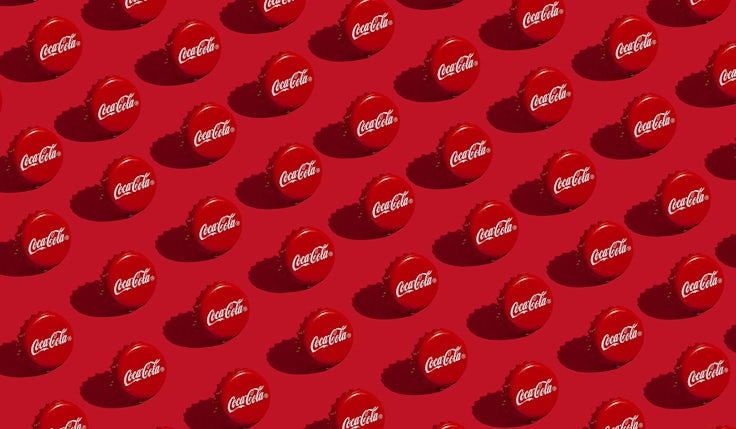Reasons to be cheerful, 1, 2, 3: Why brands and marketers still have reasons to smile
Despite economic, political and social confidence being in short supply, Ian Dury and the Blockheads’ classic 70s anthem is a great reminder that our industry still has many reasons to be cheerful about the future of marketing and advertising.

Marketing can make a positive contribution to society and to the planet if organisations appreciate its importance – particularly during difficult economic times.
This was the theme of a roundtable hosted by Tag, the global creative production house, at the Cannes Lions International Festival of Creativity, chaired by Marketing Week’s editor-in-chief Russell Parsons.
At the session, inspired by Ian Dury and The Blockheads’ 1979 single ‘Reasons to Be Cheerful, Part 3’, Parsons outlined how positivity for the industry still centres on companies and their investors regarding advertising and marketing as an investment and not a cost.
But conveying this message effectively remains a challenge, according to the panel of leading brands and marketing industry experts, some of whom spoke under the Chatham House rule.
Karen Fraser, senior director brands and consumers at Ipsos, made no apologies for her positivity. She said it was easy to be gloomy due to factors such as Covid and inflation, but she remains “chirpy” about the industry’s outlook.
“The first reason for my positivity is that advertising spend is in good health, the second is that increased spend leads to better creative and the third is that our sector can help businesses become more sustainable,” she said.
She cited GroupM’s 2022 forecast, whose latest update in June suggests global ad industry spending will grow 8.4% this year. She added that the stories coming out of Cannes demonstrate perfectly how healthy expenditure leads to creative success, while the advertising industry can be proud of the work it is doing to help tackle climate change.
Fraser said the advertising and marketing sector just needs to have more confidence and do more to convince itself and others of the positive contribution it makes. She cited research from the Advertising Association, which discovered that, for every £1 spent on advertising in the UK, £6 is generated for the wider economy.
Investors want us to demonstrate efficiency and that we are investing enough – but not too much – in marketing.
The panel agreed that telling the positive story will become increasingly important over the coming months, as the world potentially slips into recession.
The experts reiterated their experiences from previous downturns where the advertisers that continued to invest in their brands often emerged stronger than those that did not. Indeed, a recession can provide an opportunity to transform a business’s fortunes through creative and innovative marketing.
A purchasing director at a global beauty brand said it was important to remain positive in difficult times, and to get the balance right between efficiency and effectiveness when investing in brand building and measuring performance.
“Investors want us to demonstrate efficiency and that we are investing enough – but not too much – in marketing,” he said. “The pandemic meant our company was spending less money on other areas of the business such as travel, and this meant we could invest more in marketing. It was a wise decision to invest in the long term, but not [every investor] in the City accepted that or recognised it.”
ISBA director general Phil Smith shared considerable insight during the discussion and mentioned how new econometric models, based on different methodology, will look at the long-term effect of advertising.
“The returns from advertising over the longer term will be accounted for in a way that starts to make sense from a CFO’s perspective,” he said. “They can look at it as an investment over a number of years, not just on the basis of a single year.”
Efforts to reduce waste
The panel agreed that, in the current economic environment, it is essential to demonstrate to all stakeholders that marketing money is not being wasted.
Andria Vidler, CEO at Tag EMEA, gave the example of how money can be misspent during retail activations, because often promotional and in-store materials are never used or incorrectly deployed by individual stores. She said better campaign planning and auditing was required. “You can’t always guarantee that everything is being properly utilised, and the danger is that at the end of the activity you discover that stuff has just been left in the cupboard or, worse still, gone straight in the bin. This is such a shame after all the effort and money invested”.
She added that some clients admitted they felt they were wasting as much as 65% of their production budget on unused materials. “They need help to get things under control so they can start benchmarking and manage their spend day-to-day. If you cannot measure it, you cannot manage it, but first you need to understand what you want to measure.”
Waste also occurs because different marketing functions, such as media, creative or production, remain siloed within many organisations, with each working with their own self-interest front of mind.
The director of an in-house agency at a media company said it would help if creatives, for example, had a better understanding of what impact their ideas had on a business and the costs involved.
“That’s a very unpopular view that I hold, because I am the business side of the operation,” she said. “But the reality is the big idea is not what sells things. Somebody will watch the big sexy TV ad and [say], oh, that was nice. And then they’ll forget about it. It’s about creating marketing that makes a difference.”
Smith agreed that big creative ideas are important, but there must be more focus on how the brand shows up in marketing, its relevance and how an idea engages and entertains people.
“The industry can often talk a better story than it delivers when it comes to relevance and creativity,” he said. “The talk about targeting has also been very strong, but that’s not been the experience of consumers when you ask them about how well they are being served with advertising.”
There was a consensus among the panel that, although things are by no means perfect when it comes to using digital platforms, the industry is learning fast regarding creativity and effectiveness. This is being helped by more investment in data analytics.
Smith referenced a study ISBA conducted with consultancy PwC in 2020, which revealed that some advertisers were spending up to 25% of their money on unreliable third-party data. The end of cookies could therefore be another positive as brands put more of a reliance on first-party data.
“Everyone is scrambling to generate their first-party data because there is a realisation that purchased third-party data just wasn’t delivering.”
The participants also explored the importance of more collaboration to help promote advertising and marketing’s positive story. This included a suggestion that some global organisations may be engendering too much conflict when encouraging internal creative competition to drive business growth, and that more collaboration should be prioritised.
Progress on sustainability
The experts also discussed the positive impact marketing and advertising is having on the sustainability debate.
The industry should be proud about how it is stimulating demand for greener products and services, for example, and how this is increasing competition and encouraging innovation. Similarly, a number of food brands have effectively communicated the changes they have made to adopt more sustainable production practices and encourage healthier lifestyles, such as reducing fats and sugars.
The marketing industry must clearly be seen to ‘walk the walk’ when it comes to sustainability, and the Advertising Association’s Ad Net Zero initiative is one example of where this is being put into practice. This is an industry-wide drive to reduce the carbon impact of developing, producing and running advertising to net zero by the end of 2030, which means organisations must commit to make practical changes to the way they run their advertising operations.
The panel also applauded the World Federation of Advertisers’ Planet Pledge, launched in 2021 to help marketers lead on the challenges posed to their organisations by climate change.
One difficulty for global brands is the varying levels of priority given to sustainability in different territories. For example, organisations whose headquarters are in the US can sometimes come under more pressure from investors and may not be as keen to take climate change as seriously as those working in their offices in Europe.
“This can be a real challenge for organisations because there are different regulations when it comes to sustainability,” said Tag’s Vidler. “This can be really hard for organisations internally, where the business is run locally or regionally but it’s the same product.”
When it comes to advertising production, there was a feeling more could be done to make the industry more sustainable and to involve clients in the debate. The participants also agreed that the industry should not feel guilty about admitting there are commercial benefits from being more sustainable.
For example, more emphasis should be placed on using technology when planning campaigns and considering where the filming of advertising takes place. The pandemic demonstrated that brands do not have to jet off to exotic locations to produce great creative. They should also set sustainability KPIs on suppliers when outsourcing services such as print.
There are still frustrations, however, even when brands do act responsibly. One panel member cited how her brand was criticised for boring packaging after making a conscious decision to use only one colour on its packs, to make production more sustainable.
Many industries can struggle to feel cheerful in the current economic climate, and it is easy to focus on the challenges. However, for advertising and marketing there is a clear path to growth and the industry must not be afraid to focus on the positives. After all, there are plenty of great things to shout about.






